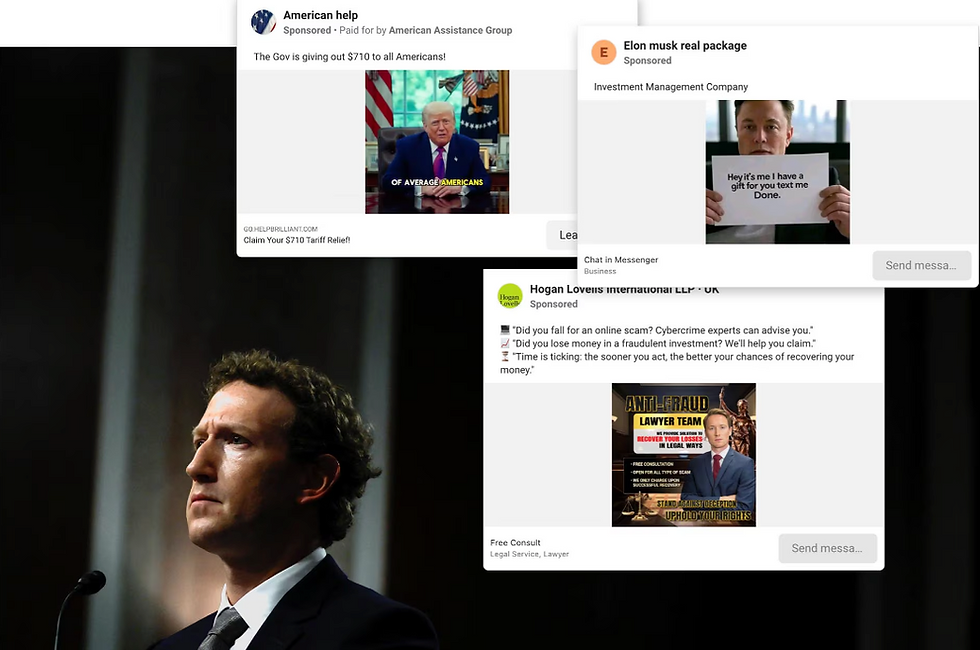PSA: Meta Knows It’s Profiting from Scamming You — and They're Okay With That
- Rich Washburn

- Nov 7, 2025
- 3 min read


Let’s not sugarcoat it: Meta has been knowingly profiting from scam ads on its platforms, and new internal documents show just how deep the rabbit hole goes.
According to a bombshell Reuters investigation, Meta (yes, the company that owns Facebook, Instagram, and WhatsApp) internally projected that 10% of its 2024 revenue — roughly $16 billion — would come from ads promoting scams, fraud, or banned products. Not suspected scams. Not accidental ones. These are known bad actors using Meta's ad network to rip people off, at scale. And Meta has the receipts.
Let that sink in.
They’re not just looking the other way. They’ve built internal revenue models around these scams. This isn’t a data breach. It’s not a mistake. This is deliberate monetization of fraud — a business line where the product is you, and the profit comes from watching you get scammed.
Not just bad. Predatory.
Here’s what makes this so egregious: Meta’s own systems reportedly flag about 15 billion scammy ads per day — and instead of banning those advertisers, they run the ads and just charge them more (something they call “penalty bids”). It's like catching a pickpocket in the act and saying, “Hey, I’ll let you keep stealing, just toss a little extra my way.”
Meanwhile, enforcement teams inside Meta were allegedly told not to take action against high-risk ad accounts if it meant losing more than 0.15% of revenue. In real dollars, that’s about $135 million worth of allowed fraud… by policy.
And yes, Meta knows the damage. Their own internal presentation said that one in three successful scams in the U.S. originated on their platforms. In the UK, over half of all payments-related fraud losses in 2023 came from Meta platforms.
This is not a company that accidentally exposed your data. This is a company that ran the numbers and said, “Screw it — we’ll make more by keeping the scam ads live.”
This should be existential.
Let’s call this what it is: industrial-scale predation. When a platform this big — with this much data, targeting precision, and market dominance — knowingly turns itself into a fraud factory, it ceases to be a tech company and becomes a threat vector.
The DOJ should be on this. Regulators should be dragging Zuckerberg back to testify under oath — not for bad algorithms or privacy concerns, but for what is arguably systematic facilitation of financial fraud.
Because that’s what this is: fraud. Meta profits every time someone gets scammed — and they’ve built systems to keep that faucet flowing. If they get fined? No big deal — they’ve already budgeted for it. One internal doc says they expect about $1 billion in regulatory exposure, but they're making $3.5 billion every six months off the high-risk ads alone.
You think they’re worried? This is a cost-of-doing-business model — and the cost is us.
The trust breach is real.
I say this as someone who’s used Meta products. I’ve developed for them. I've advised companies who advertise on their platforms. This isn’t coming from some anti-tech crusade. This is a warning from inside the ecosystem: when a company this large openly trades consumer safety for profit, it’s time to ask whether we can trust them with anything at all.
Tech already has a trust problem with the public. Stories like this are the reason. And if Meta walks away from this with another wrist slap, it sends a message to every platform: predatory revenue is fair game, as long as you don’t get caught too fast.
That’s not just bad optics — that’s an existential threat to consumer protection in the digital age.
What now?
We don’t need another apology video. We don’t need another vague blog post from Meta about “safety teams” or “updated policies.” We need consequences. Real ones.
Regulatory fines should not just hurt — they should threaten the business model that made this possible.
Leadership should be held personally accountable, not just the faceless “platform.”
And yes — if there’s legal exposure for knowingly enabling fraud, that should be pursued.
This isn’t about cancel culture. This is about consequences for companies that profit from letting you get robbed in plain sight.
Because if we don’t draw the line here, we might as well start calling scam ads a "feature."
#MetaScandal, #AdFraud, #TechAccountability, #DigitalEthics, #ConsumerProtection, #OnlineScams, #MetaExposed, #BigTechCorruption, #DataAbuse, #TrustInTech





Comments